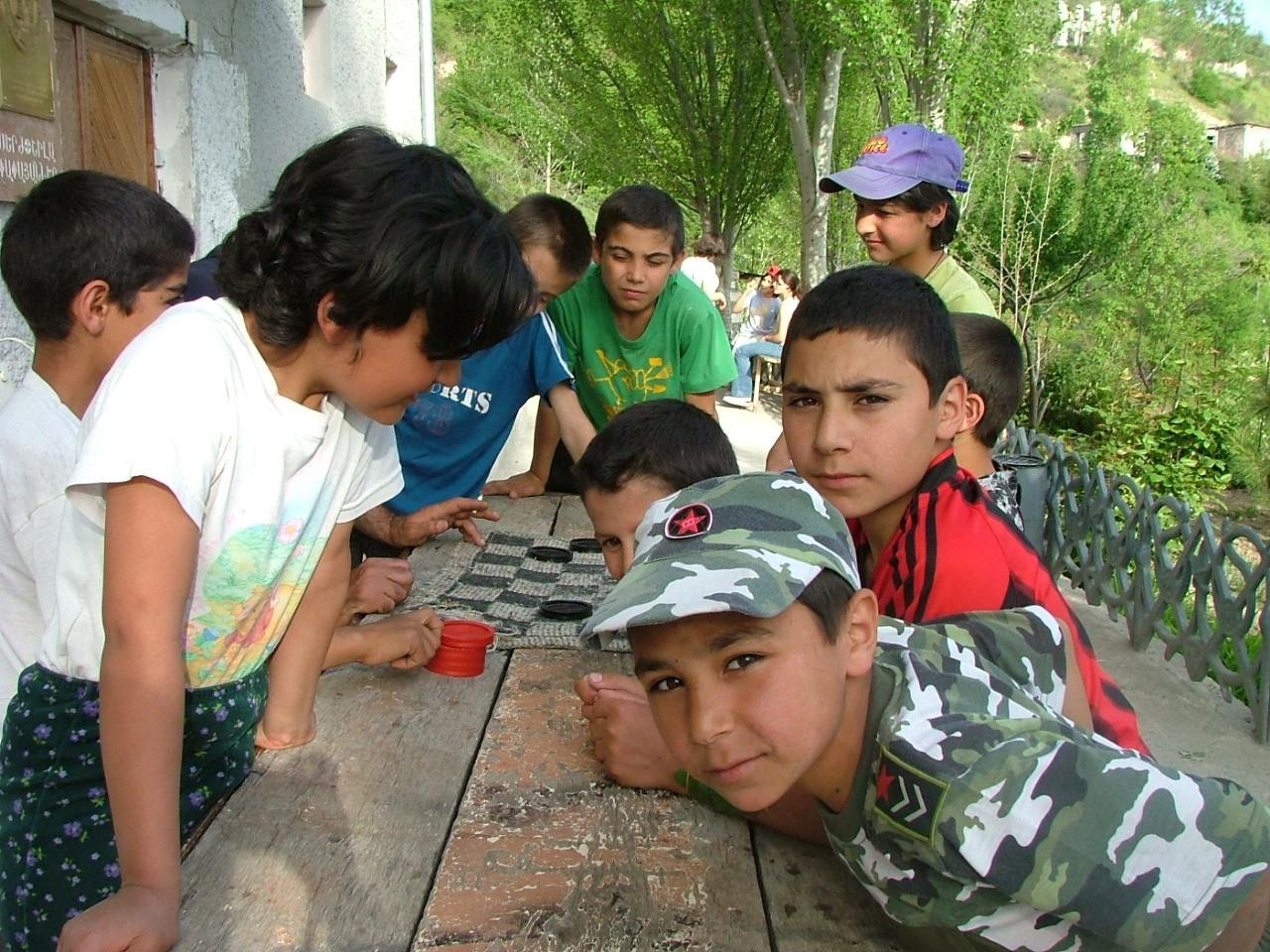
Berdzor’s Boarding School
Three-year old Erik has been living in the boarding school at Berdzor, the regional center of Kashatagh, for the past four months.
Erik does not speak. He listens carefully and understands everything, but expresses his thoughts and feelings through a few rare hand gestures and other body language.
The teachers here said that the child was physically completely healthy, that his silence was due to psychological reasons – nobody has cared for the child since the time of his birth. Erik's mother ran away from the southernvillageofSurenavana few months ago, leaving her sister to deal with Erik, his brother Nelson and sister Greta. Some time later, her sister asked the authorities to take charge of the children, because she could no longer care for them herself. The police brought the children to the boarding school.
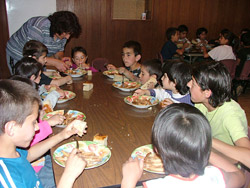 “When they first brought the children here,” recalled principal Samvel Kocharyan, “the children were in horrible condition. All three of them had worms; Erik spent ten days in hospital. They were dressed in rags and had size 42 shoes on.”
“When they first brought the children here,” recalled principal Samvel Kocharyan, “the children were in horrible condition. All three of them had worms; Erik spent ten days in hospital. They were dressed in rags and had size 42 shoes on.”
Erik's mother, Shushanik, was located and forced to bring their birth certificates to the boarding school. She vanished again afterwards. Shushanik then started to work as a milkmaid in a village. She was from Goris by birth and often visited the town.
Shushanik was one of six children. Her brother and sisters were among the first children at the boarding school. Shushanik was the exception, since she had already turned 18 in 1995, when the boarding school first opened.
Although the institution is called a boarding school, it is actually an orphanage. It was decided to call it a boarding school for psychological reasons, in order not to cause the children any emotional harm with the word “orphanage.”
Thirty children live at the boarding school. They are mostly from the villages of Kashatagh.
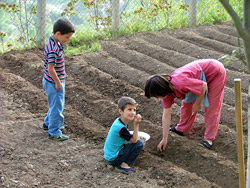 Two children have lost both their parents, and all the others there have at least one parent. The mothers of a majority of the children are alive. The children who are six or older go to school. Besides that, they have three teachers – Armenian, Russian and English language specialists – and three nannies.
Two children have lost both their parents, and all the others there have at least one parent. The mothers of a majority of the children are alive. The children who are six or older go to school. Besides that, they have three teachers – Armenian, Russian and English language specialists – and three nannies.
Teacher Ella Khatchatryan grew up in the orphanage herself. She has been working here for the past four years. Principal Samvel Kocharyan said that he had asked the Kashatagh administration to provide her with an apartment on more than one occasion, but there had been constant delays.
Karine, one of the children at the boarding school, finished her school education this year, but will continue to live there – she needs an apartment too. The children who enter adulthood are usually sent to stay with relatives, but Karine had nobody to go to.
“We will do everything we can so that Karine gets a scholarship to study in college,” said Kocharyan, “and, naturally, she will stay at the boarding school until she is allocated an apartment. But that is no solution to the problem – I can't keep everyone at the boarding school indefinitely, no matter how much I want to.”
The children lived in a tidy three-story building. The only thing missing was comfortable furniture.
The children play during the day or work with the teachers in the vegetable garden. Samvel Kocharyan said that if the school had a bus or a minibus, then they could take the children out for field trips - otherwise the children practically go nowhere. Sometimes they gather their tents and go down near the river, where the school owns a small piece of land.
The boarding school needs more specialized teachers. “The teachers make 52,000 drams here, and their typical workday is eight hours, whereas school teachers make 70,000 drams working from 9 am to 1 pm. So why would anyone come to work for me? For some strange reason, when the salaries of kindergarten and school teachers went up 27%, our staff was ignored,” Kocharyan said. “Besides that, not everyone can work here. You have to be a psychologist of sorts and approach each child differently – after all, they've lived in very different conditions before coming here.”
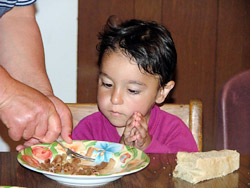 The principal said that when Erik first came to the boarding school, they would put food on the table but he would not touch it. Then they would put a piece of bread in front of him and he would eat the whole thing and collect the crumbs as well.
The principal said that when Erik first came to the boarding school, they would put food on the table but he would not touch it. Then they would put a piece of bread in front of him and he would eat the whole thing and collect the crumbs as well.
This meant that, at his aunt's house, each person would be given their own portion of food and that “rule” was not to be broken.
“We had a brother and sister who lived here seven years but never once ate meat. Their mother had left them in the village and gone toYerevan. The children had been cared for by their neighbor, who would feed them rats. There are children who keep pieces of bread under their pillow for the first few months. It's obvious why they do that. One has to patiently wait until they learn that they will no longer go hungry and give up those habits.”
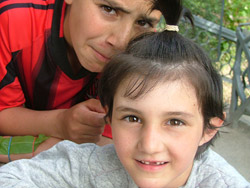 The children had a television room and a large video collection. They are crazy about Indian movies. Eleven-year-old Sassun wants to be an actor when he grew up.
The children had a television room and a large video collection. They are crazy about Indian movies. Eleven-year-old Sassun wants to be an actor when he grew up.
“Who would you like to play?” I asked, “Who is your favorite hero?”
“Everyone is a hero in their own way,” he said maturely, shrugging his shoulders. After some thinking, he said, “I want to be like Shah Rukh Khan.”
Twelve-year old Nelly likes another Bollywood star, Karina Kapoor.
“I'll do anything to become an actress,” she said, “or at least a singer. I was born for the stage – I can play any role. I am really talented, it would be a shame to waste it.”
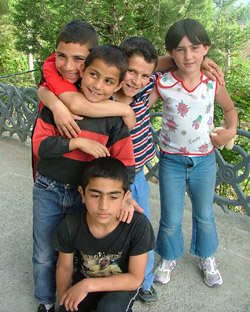 “Do you watch soap operas?” I asked.
“Do you watch soap operas?” I asked.
“No, they don't let us,” said Sassun, “They only talk about love in soap operas and we're still too little for that.”
“When will you grow up?” I asked.
“After we're eighteen,” he answered confidently.
Twelve-year old Arman had composed a poem about his mother, with the help of his teacher:
I love my mother
She gave me life,
Fed me, kept me, caressed me,
Sang me sweet lullabies.
I am proud of her
She is the sunshine at home
Let me tell everyone
That mothers are sacred.
“My mother will soon come to see me,” said Arman, his serious eyes shining with joy.
Law enforcement officers had brought Arman and his brothers to the boarding school. The youngest, a newborn, has already been adopted. Arman's mother comes once a year, usually in the fall, to see them. She asks that the children be allowed to go with her, to help her pick walnuts.
 Videos
Videos Photos
Photos
Write a comment